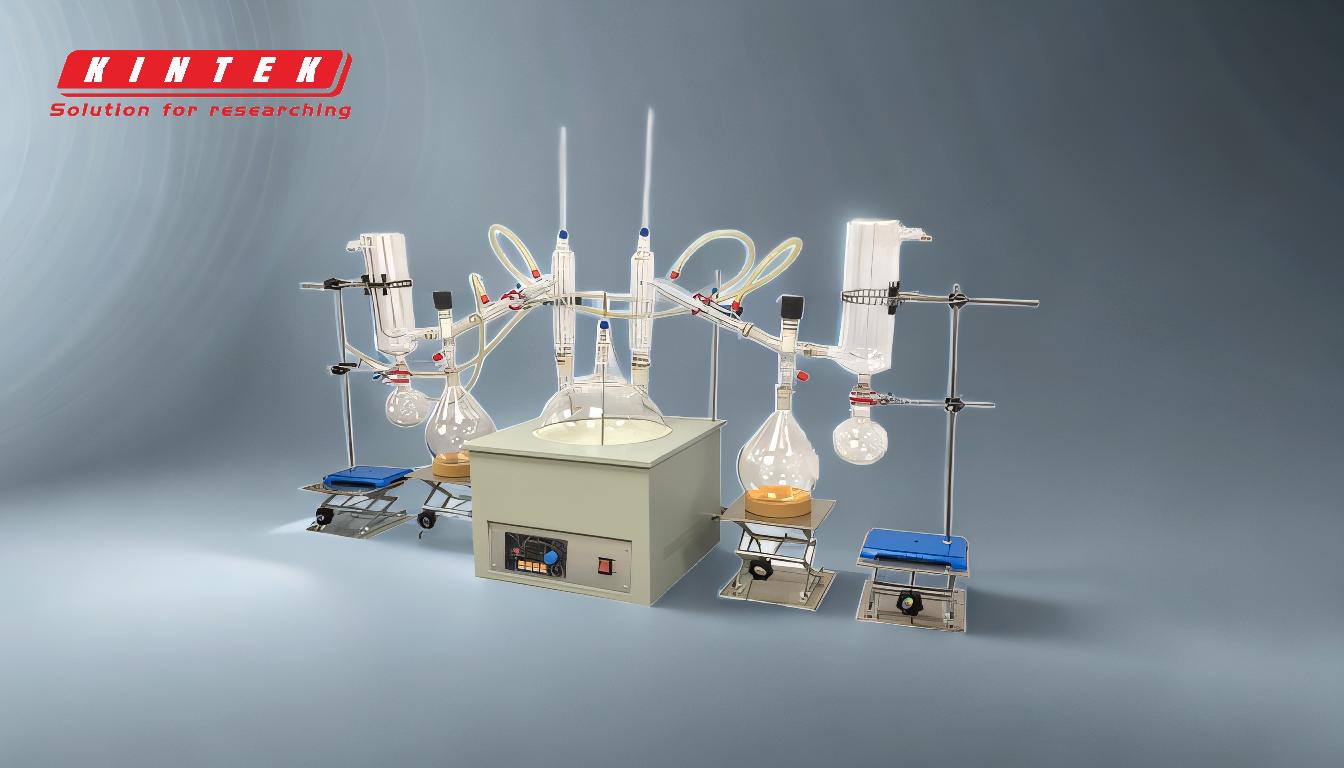Molecular distillation is a specialized form of vacuum distillation that operates under extremely low pressures, typically below 0.01 torr (1.3 Pa). This process is designed to handle thermally sensitive materials, high molecular weight compounds, and complex molecules by minimizing thermal degradation. It relies on the principle of free molecular flow, where the mean free path of molecules is comparable to the distance between the evaporation and condensation surfaces. This setup ensures efficient separation, purification, and concentration of materials like cannabinoids, vitamins, and polyunsaturated fatty acids. The process is often referred to as short-path distillation due to the close proximity of the evaporation and condensation surfaces, which is critical for its effectiveness.
Key Points Explained:

-
Definition of Molecular Distillation:
- Molecular distillation is a type of vacuum distillation that operates under extremely low pressures, typically below 0.01 torr (1.3 Pa).
- It is characterized by the free molecular flow regime, where the mean free path of molecules is comparable to the size of the equipment.
-
Free Molecular Flow Regime:
- In this regime, the distance between molecular collisions is large compared to the dimensions of the equipment.
- This allows for the separation of liquid mixtures based on the difference in the evaporation rates of their components.
-
Short-Path Distillation:
- Molecular distillation is often referred to as short-path distillation because the condensation surface is placed very close to the evaporation surface.
- This close proximity is crucial for the effective separation of thermally sensitive materials.
-
Applications of Molecular Distillation:
- Separation and Purification: It is used to separate and purify complex molecules and natural products.
- Concentration: It is effective in concentrating thermally sensitive substances such as vitamins and polyunsaturated fatty acids.
- Thermally Sensitive Materials: It is particularly useful for materials that degrade at high temperatures.
-
Equipment and Setup:
- Molecular Still: The process is performed using a molecular still, which is designed to maintain the necessary vacuum and temperature conditions.
- Evaporation and Condensation Surfaces: The distance between these surfaces is critical; if too far apart, the process becomes less efficient.
-
Advantages of Molecular Distillation:
- Low Thermal Degradation: Operates at lower temperatures, reducing the risk of thermal degradation.
- High Purity: Achieves high purity levels due to the precise control of evaporation and condensation.
- Versatility: Can handle a wide range of materials, including those with high molecular weights and complex structures.
-
Comparison with Other Distillation Techniques:
- Traditional Distillation: Operates at higher pressures and temperatures, which can lead to thermal degradation of sensitive materials.
- Molecular Distillation: Offers a gentler alternative, preserving the integrity of thermally sensitive compounds.
-
Key Considerations for Equipment Purchasers:
- Vacuum System: Ensure the system can maintain the required low pressure (≈ 0.01 torr).
- Material Compatibility: Choose materials that are compatible with the substances being processed to avoid contamination.
- Surface Proximity: Verify that the distance between the evaporation and condensation surfaces is optimized for the specific application.
- Temperature Control: Precise temperature control is essential to prevent thermal degradation and ensure efficient separation.
By understanding these key points, equipment and consumable purchasers can make informed decisions when selecting molecular distillation systems, ensuring they meet the specific needs of their applications.
Summary Table:
| Aspect | Details |
|---|---|
| Definition | A vacuum distillation process operating below 0.01 torr (1.3 Pa). |
| Key Principle | Free molecular flow regime for efficient separation. |
| Applications | Separation, purification, and concentration of thermally sensitive materials. |
| Advantages | Low thermal degradation, high purity, and versatility. |
| Equipment Considerations | Vacuum system, material compatibility, surface proximity, temperature control. |
Discover how molecular distillation can enhance your processes—contact our experts today!










